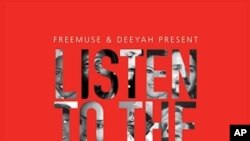One of Cameroon's best known and most controversial musicians, Lapiro de Mbanga, is spending this year's fifth annual International Music Freedom Day at a Douala courthouse not far from his jail cell. Lapiro is citing wrongful imprisonment for a song that put him behind bars nearly three years ago.
Since April 2008, Lapiro has been detained at New Bell Prison, otherwise known as 'Hell Prison', for writing "Constipated Constitution"" The lyrics denounce a constitutional amendment that gives Cameroon's president, Paul Biya, 78, unlimited terms in office. Lapiro, whose real name is Lambo Pierre Roger Sandjo, spoke on the phone outside the prison as he was coming back from a recent court hearing.
He said he wrote the song because it's his job. The song came out two days before parliament changed the constitution to what he calls the "false constitution." In his opinion, Cameroon has never had a constitution. He says if you consider a constitution as something that is made by a constitutional council, Cameroon has never had one. So he says he wrote the song "Constipated Constitution" to explain all the country's troubles.
Cameroon has one of the highest rates of corruption in the world. This is according to the United States-based Task Force on Financial Integrity and Economic Development, an international government and research advocacy group. President Biya, who came to power in 1982, is worth an estimated $100 million. The majority of Cameroon's 20 million people still live off less than $1 per day.
Today, Lapiro says, if we look at what's happening in Tunisia and Egypt it is because people have communicated with Internet. So while others are communicating online, he says he has to communicate through his music. He says music is a powerful vehicle. He says it wakes people up. It taps into their consciousness. He says music, when it becomes a factor in communication, can be very powerful.
Ole Reitov is program manager for FreeMuse, a Copenhagen-based advocacy group that fights for freedom of musical expression around the world. Since Lapiro was taken in chains to live among 3,000 other detainees at New Bell Prison, FreeMuse has been actively lobbying for his release.
"In Africa in general, music plays a very interesting role, because with social commentary you cannot really stop people from exchanging views on how they look at society," said Reitov. "In Cameroon particularly, there's no doubt that Lapiro, for many, many years has been - I remember there was an article by an academic who called him - 'The sheriff of the backyard,' someone who watches what is really going on, what's the dirty part of society and it gives life to people. Of course, news media can do that as well, but they can also easily be censored. And even if you put him sitting behind bars, you can't really stop his songs, you know people are still singing them and making use of them at demonstrations. So the interesting thing about music is that it transcends somehow gender, age, ethnic groups and whatnot. I think the whole oral tradition in Africa is still very, very important. And music is probably the most important force in social commentary these days."
Lapiro de Mbanga has been a strong presence on Cameroon's musical stage since 1985. He sings in the local Creole known as Mboko talk. This is a pidgin language that combines French, English and Douala and is a way of reaching people from all segments of society.
In his song Constipated Constitution, Lapiro pokes fun at the government. He calls President Biya a "paco" who is "daya" - an old man who is tired - and says "Cameroon is the birthplace of advanced democracy - a place that is beautiful, full of electoral frauds and a paradise for corruption."
But on International Music Freedom Day, it is Lapiro's turn to take his government to court. It is his chance to charge those who put him in jail to begin with and fined him over $1000.
He says what he is experiencing in prison is a stage in the life he has chosen to live as a fighter. Lapiro says he sees his situation as a boxing match. He says you have to give some and take some. Lapiro says he throws his punches through his voice and through his music. And the government, from their side, he says, throws punches by putting him in prison. Now who is going to win? he asks. He responds the people will win.




